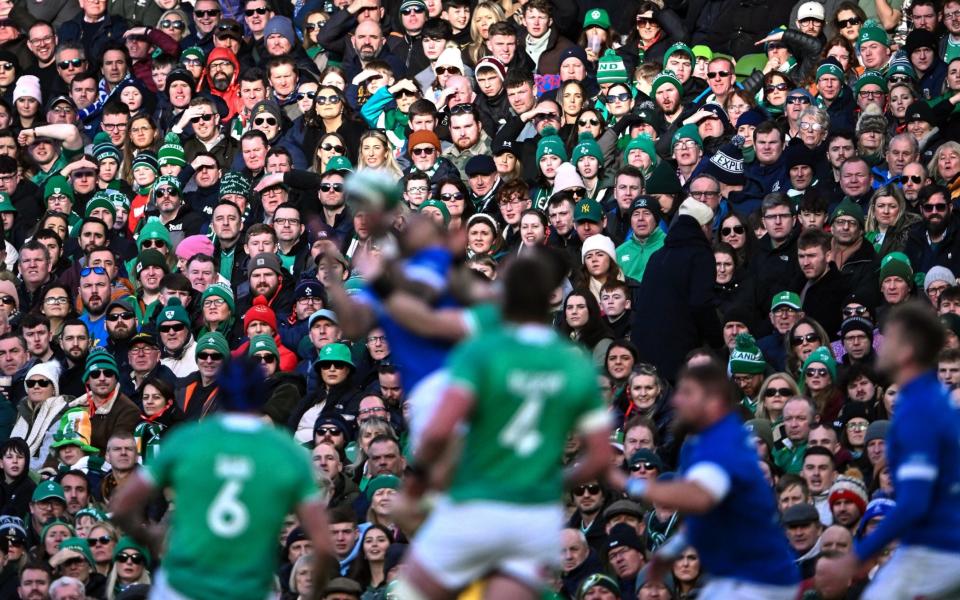Forget Twickenham, Dublin is the Six Nations city with an atmosphere problem

Twickenham’s recent botched experiment with an ‘alcohol-free seating area’ - to improve the experience for fans who object to people getting up and down ad nauseam during a game - was interesting because over in Dublin they have been discussing doing the exact opposite in an attempt to spice up the atmosphere.
“I think maybe having sections that are catered a little bit more for students, or younger people… and they are maybe encouraged to have a few more pints would be no harm,” suggested Ireland’s No 8 Caelan Doris last week when asked for his thoughts on an issue that has been known to afflict the Aviva Stadium from time to time.
Doris was Ireland’s captain for the day for their Six Nations thumping of Italy two weekends ago, when the atmosphere was so subdued it reignited a longstanding debate about corporate jollies and the cost of tickets, and how to create a bearpit.
“Maybe, like you see in France, they’ve got the drums going and they’ve got a little bit more music or stuff like that,” was another of Doris’s suggestions.
Of course, a foregone conclusion against Italy on a Sunday afternoon is a very different proposition to a Saturday afternoon clash with old enemies Wales.
That Italy game was over as a contest well before half-time. One hopes the atmosphere in the Aviva will be a lot more raucous come Saturday (mind you, this is a young, developing Wales team, and they could quite easily suffer the same fate as Italy at the hands of one of the best-drilled teams in the world).
But even if the match proves to be a cracker, and the atmosphere off-the-charts good, the Aviva - like Twickenham, like the Principality - has deeper-rooted problems that need addressing.
Ireland’s fans are certainly not one of them. To witness the way the 40,000-50,000 ‘Zombie Army’ got behind their team during the recent World Cup, creating a genuinely spine-tingling atmosphere as they united post-match to sing The Cranberries’ unofficial anthem, or launched into Fields of Athenry during each match, was to appreciate that this is not an issue of support.
Has Zombie ever sounded better. The character shown by this Irish team is inspirational. What a night pic.twitter.com/a2Cdx2kxOY
— Donal Lenihan (@LenihanDonal) September 23, 2023
Nor is it the stadium’s fault. By all accounts, the atmosphere at the last two AIL finals and the recent FAI Cup finals, were electric. We know in the right conditions, unsurprisingly when the stakes are at their highest - against the All Blacks in 2013 and 2018, or England in 2017 - the Aviva can create an incredible noise.
The problem is the set-up too often risks failing to harness that support.
Fans are not segregated in the same way as they are at football. Hardcore are not grouped together, creating singing sections. The demographic is in any case totally different to the AIL. The cost of tickets to rugby internationals these days is eye-watering, pricing many out of going to games. Many of the tickets end up in corporate hands. The net result is that the games can feel like an event where the atmosphere is fed to the punters rather than generated by them.
Throw in the fact that Ireland are so good these days that very few teams can genuinely challenge them at home, and you risk the sort of atmosphere that prevailed against Italy, when the crowd seemed half-asleep until Hugo Keenan woke them up with a brilliant tap-and-go 10 minutes into the game (the long presidential greeting followed by three anthems might not have helped).
How to spice it up? Opinion is divided on the use of pyrotechnics pre- and post-match. Or blaring music when the clock is stopped. It can feel contrived. The deployment of Zombie was incredible in France. But playing it after the first three tries against Italy two weeks ago? As one fan on social media wrote: “Aviva playing Zombie after every try is the rugby equivalent of an aunt hearing you liked trains when you were eight and so every birthday card for the next 20 years has a train on it.”

But the Aviva is right to experiment. You cannot play New Zealand or South Africa every week. Like its counterparts in England, Scotland and Wales, the IRFU is not suddenly going to cut ticket prices in half when there are fans willing to pay what they currently charge. Whether it is creating singing sections, drinking sections, drum sections, safe-standing sections, cutting the ceremonial waffle at the start, allowing more booze, less booze, or bringing back that eight-year-old Stevie Mulrooney, who sang Ireland’s Call with such gusto last time out, all options should be on the table.
Andy Farrell is too diplomatic to make an issue of it. But his players certainly picked up on the subdued vibe against Italy.
“In comparison to Marseille [against France, a Friday evening game] when I came on I nearly got one of the calls wrong because I couldn’t really hear what James [Ryan] was saying for the call for the lineout because of the noise,” admitted Jack Conan to RTE after the game. “There were definitely some lulls in the crowd. But it’s Sunday at 3 o’clock. It’s very different to playing Saturday at 7.45 or 8 o’clock kick-off. It’s a different demographic altogether.”

 Yahoo Sport
Yahoo Sport 



































































